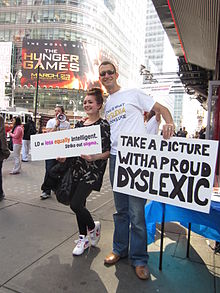| Learning disability | |
|---|---|
| Other names | Specific learning disorder,[1] learning difficulties,[2] developmental academic disorder,[3][4] developmental disorder of scholastic skills[4] knowledge acquisition disability,[4] learning disorder,[4] learning difference[5] |
 | |
| People at a Learning Disabilities Month event[6] | |
| Specialty | Psychiatry, neurology |
| Symptoms | Difficulties in school[7] |
| Complications | Unemployment[1] |
| Usual onset | Childhood[7] |
| Types | Reading disability (dyslexia), math disability (dyscalculia), writing disability (dysgraphia), nonverbal learning disability[7] |
| Risk factors | Family history, poverty, prematurity, alcohol[7] |
| Differential diagnosis | Being disadvantaged, intellectual disability, hearing impairment, traumatic brain injury, ADHD[7][1] |
| Frequency | ~10% of children[1] |
Learning disabilities (LDs), also known as learning disorders, are a group of conditions that affect the ability to acquire, organize, retain, comprehend, or use verbal or nonverbal information.[7] Intelligence is generally otherwise normal.[7] Onset is during childhood with difficulties in school.[7] Reading disability (dyslexia) makes up about 80% of cases with other types including math disability (dyscalculia), writing disability (dysgraphia), and nonverbal learning disability.[7]
The cause is believed to be a combination of genetic and environmental factors.[7] Risk factors include family history, poverty, prematurity, and nicotine or alcohol exposure during early development.[7][1] The underlying mechanism is believed to be neurological in nature.[7] Diagnosis requires ruling out other potential causes such as being disadvantaged, intellectual disability, hearing impairment, traumatic brain injury, or ADHD.[7][1] LDs; however, are often associated with ADHD, autism, depression, or oppositional defiant disorder.[7]
Management generally involves a combination of teachers, psychologists, and physicians among others.[7] Speech therapy may help with reading disability.[7] Physical therapy may help with difficulty writing.[7] Associated disorders may also require treatment.[7] About 5 to 15% of school aged children are affected globally.[7][1] About 4% of adults remain affected.[1] Males are affected more often than females.[1] Long term consequences may include unemployment.[1]
References edit
- ^ a b c d e f g h i j Diagnostic and Statistical Manual of Mental Disorders (Fifth ed.). American Psychiatric Association. 2013. pp. 66-74. doi:10.1176/appi.books.9780890425596.156852. ISBN 978-0-89042-555-8.
{{cite book}}: Cite has empty unknown parameter:|1=(help) - ^ "Developmental academic disorder (Concept Id: C1330966) - MedGen". NCBI. 2019-12-20. Archived from the original on 2021-04-12. Retrieved 2019-12-20.
- ^ "Code System Concept". phinvads.cdc.gov. 2018-12-05. Archived from the original on 2020-07-21. Retrieved 2019-12-20.
- ^ a b c d "2020 ICD-10-CM Diagnosis Code F81.9: Developmental disorder of scholastic skills, unspecified". The Web's Free 2019/2020 ICD-10-CM/PCS Medical Coding Reference. 2019-10-01. Archived from the original on 2018-05-10. Retrieved 2019-12-20.
- ^ "Learning Disabilities vs. Differences". www.ldanys.org. Archived from the original on 15 April 2021. Retrieved 1 March 2021.
- ^ Kate Adams (September 30, 2012). "October Is Learning Disabilities Awareness Month in Canada!". baytoday.ca. LDAO – North Bay and Area News Release. Archived from the original on 21 July 2015. Retrieved 28 April 2015.
- ^ a b c d e f g h i j k l m n o p q r s Dominguez, O; Carugno, P (January 2021). "Learning Disability". PMID 32119258.
{{cite journal}}: Cite journal requires|journal=(help)